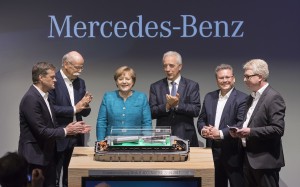
German authorities are investigating Mercedes-Benz parent company, Daimler AG, over collusion charges.
A new scandal involving allegations of collusion by German automakers continues to deepen and to threaten the cooperation among companies scrambling to meet new competitive pressures.
It will affect not only from carmakers in Asia and North America but also tech companies looking for a larger piece of auto industry’s revenue.
Anti-trust regulators from the European Union and Germany are probing allegations that German automakers colluded in effort to evade regulations and anti-cartel regulations and edicts.
The European Commission has now indicated that Daimler AG, BMW AG and Volkswagen AG all appear to have met secretly for decades to coordinate on vehicle development, including vehicle emissions technology, according to documents that VW handed to the commission in the wake of the diesel cheating scandal that began almost three years ago.
(BMW goes outside auto industry for marketing boss. Click Here for the story.)
The regulators are also investigating whether BMW, VW, Porsche, Audi and Mercedes-Benz parent company Daimler held meetings to discuss suppliers, prices and standards to the disadvantage of foreign carmakers.
While carmakers commonly discuss how to implement new emissions standards and technologies, the question being probed by regulators is whether talks among the German manufacturers constituted anti-competitive behavior.
Companies found guilty of breaching EU cartel rules face fines of as much as 10% of their global revenue and Daimler first raised the issue of collusion with cartel authorities, a move that could earn it immunity, according to press reports from Germany.
One byproduct of the investigation is that German carmakers have begun to turn on one another.
(Click Here for more about a former VW executive pleading guilty in emissions scandal.)
Daimler’s move to expose auto-industry-wide cartel “has totally damaged” BMW’s trust in Daimler, one BMW executive said, according to German press accounts.
While BMW and Mercedes-Benz have competed for decades with VW’s Audi division for the luxury sales crown, there has been media speculation that Daimler and BMW may combine their car-sharing services to better compete with U.S. rival Uber. A joint venture on the construction of charging station for electrified vehicles in Germany also could now be in jeopardy.
The supervisory boards of Daimler and VW are scheduled to meet this week to discuss the allegations about anti-competitive behavior among the German carmakers, according to reports.
VW supervisory board member Olaf Lies, representing the No. 2 stakeholder Lower Saxony, criticized top management for failing to inform the controlling panel about the decision to provide early evidence to antitrust authorities, regional broadcaster ffn radio reported.
(Click Here for more about Daimler’s recall of 3M diesels in Europe.)
“At the moment I cannot understand this,” Lies was quoted by ffn radio as saying in an interview.
